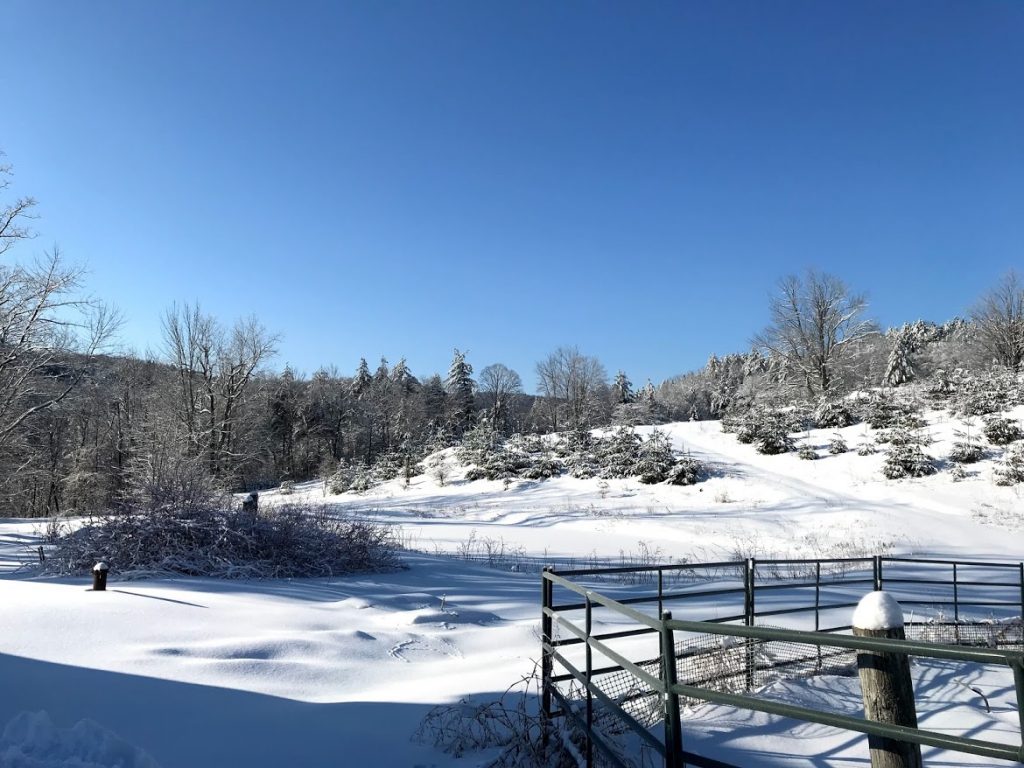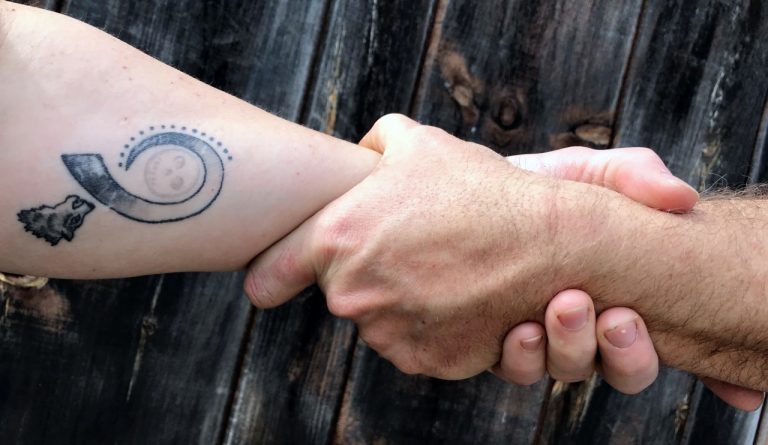2019 Shook Some Foundations; 2020 is the Year to Make It Happen

A friend of mine recently said, “When our foundations shake and we feel unstable, that’s when we grow. That’s when we find out what we are made of.” I’ve been thinking lately about the difference between 2019 and 2020. For me, 2019 was full of new ideas and directions—so many that, as another friend described, felt “like drinking from a fire hose”. The sheer amount that I read, experienced, grew, and shifted in 2019 makes me feel like an almost entirely new person (with the same brain and memories—just a very different perspective on them!).
For those who follow along with our Facebook or Instagram social media, which is sometimes better and certainly more up to date than my longer blog posts, you might know about some of the things we experienced and [mostly] accomplished in 2019 to move our farm forward as a business in service to you and us and our Central Vermont community. It was a heck of a [Fire Hose!] list:
- I initiated, conducted and successfully completed a crowdfunding campaign through iFundWomen to establish a yurt for stylish and comfortable on-farm stays. For the campaign I worked with a coach to refine my message; mapped out my participants; developed the budget; determined rewards; recorded, edited and produced my own video; and assembled all the social media materials to send out. The biggest, hardest thing I did? I learned to make direct requests to people. Nothing to hide behind, and the most exposed I’ve ever felt in my life. Wow.
- I attended a seven-day-long, “farm MBA in-a-week” program called Ranching for Profit (RFP). RFP is based on the premise that just because we know how to raise livestock, it does not mean that we automatically know how to run a business that raises livestock. Believe it or not, dear friends and customers…we do want our farms and ranches to be run like businesses. Businesses exist to serve customers, and healthy businesses are constructed in such a way that the actual owners can step away without a gap in service, and can enjoy themselves without burning out or going bankrupt. We want our farm business to be that…for you, for us, for everyone. We want to be around in this community for a long time.
- As a result of taking RFP School, I ended up reading at least 16 business and financially related books in 2019. It’s amazing how many audio books and business podcasts you can absorb while you move sheep fence.
- I enrolled in the follow-up program to RFP, called Executive Link (EL). I now have a farm board of advisors, and I serve on their boards. We are all shaping up and changing our businesses. We are learning new tools to help each other through individual and collective challenges and decisions. We have three board meetings a year, with dedicated homework in between each, and travel trips to visit each other and share more professional development. Most importantly, we keep each other accountable.
- I traveled to Wyoming in July as part of EL, and to meet other graduates of RFP from across the country. I can’t overstate this–many of you who know me well know that I work in agriculture professionally—most farms and ranches in this country are not in a healthy position financially, socially, or personally. Connecting with these amazing folks from across the country both energized me and also showed me how far I still need to go to have a healthy business. It was good to see how far the journey might be, and it strengthened my resolve to get us there.
- I restructured our farm and home cash flow through a new system called Profit First. In the first quarter, my farm profit was $19.27. That’s OK; I’ve never actually had any profit before! The mental shift that I went through just to accept that I could have profit was worth the time and money spent on RFP and EL.
- I drafted a two-year plan to grow the farm business to a point where it will support a full-time person. When I posed the question in early 2019, I didn’t even know whether this might be possible; now there’s a path forward.
- We hosted six on-farm events in 2019, from a womens’ grilling class to a five-course on-farm dinner to a meat cutting workshop.
- I hired an accountant and bookkeeping company to help keep me properly advised and moving forward successfully as my business grows. As a person who had done my own taxes for the past 38 years, this felt like maybe THE craziest change, but I need to focus on putting my energy and time into the best places for my skillset and the best result. I should be telling you all the story of the farm, and making connections with YOU instead of doing my taxes…right?
- We welcomed 26 lambs to the farm, with close to 20 of them receiving names through our crowd-funding campaign. Welcome Mable, Myrtle, Lydia, G.O.A.T., and Baarya Stark, just to name a few.
- I have begun to spend multiple mornings a week working on my business. From developing better lists and systems, to planning out our yearly cash flow and strategizing around enterprises to build up, these focused mornings are about laying that foundation for the future.
- While visiting another farm last summer I learned about Tentrr, which connects campers to sites similar to AirBnb. We are in communication with Tentrr to have a site set up and renting as soon as May.
- We established the first year of a long-term relationship with another women-owned farm nearby to triple our outdoor, heritage pork offerings while keeping our dollars and your food from piglet-to-plate within a 20-mile radius. Talk about reducing those food miles!
- After the successful yurt crowd funding campaign, we were able to construct the yurt platform and order the yurt itself. It arrived in late December 2019 (to cap the year!), and is wrapped and waiting in its shipping boxes to be installed in May, with a tentative June rental start date.
Whew!
This list isn’t there just to make myself feel better about how exhausting 2019 was (it was!), it’s about taking a few moments to look back at what happened when the foundations began to shake. It’s about celebrating that the combination of new ideas and action can change lives and situations. It’s about deciding what the right course is and refining that through habits and routines and systems, we blossom with creativity and joy. It’s about really owning our mission: Celebrating Food, Family and Farm in the Heart of Vermont. It’s figuring out what we are made of.
For me, 2019 was about changing the way that I think. The last twelve months have taught me that I’m ready to grow beyond who I have been and how I have functioned. I might be a [mostly] solo farmer blessed with a kick-butt grilling partner and in-house musician, but we can’t limit ourselves to just US. The answer is in the team. We’ve got to overcome the self-limiting cultures of farming and Vermont, and all the things that make us assume that working alone is the best and only way to be. I’m developing systems for each of our farm enterprises to make sure that our business serves our customers and community, whether I have enough hours in the day, or not. It’s not about me; it’s about finding ways for Howling Wolf Farm and Randolph, Vermont to thrive for a long time to come, which will allow Jenn and Chris to be part of both.
So here’s 2020, and we’re looking forward. I loved the new ideas of 2019, and I’m pretty grateful for the foundation shaking opportunities. That said, 2020 is the Year to Make It Happen. This is the year to strengthen new foundations, where we establish our two types of farm stay. This is the year when we crank up the pork and lamb availability. This is the year when we jump on AirBnb Experiences and start to offer farm visits and workshops to bring passionate visitors to the farm so they can really understand how well-managed grazing can save the world, and how connecting with and buying from local farms is one of the most powerful, real-life actions possible. This is the year we refine systems. This is the year we increase the art offerings on the farm. This is the year we take time for ourselves to better understand and create what others are looking for in agri- and eco-tourism. This is the year that we really start the journey.
I’ve long maintained that we truly started farming in 2000; the first year that we sold pigs to other people and did more than raise livestock (poultry) for ourselves. Twenty years later, I think we are actually stepping into our role as a solid farm business serving our community.
I didn’t expect it to take this long, but I’ve always been a bit of a late bloomer. Thanks for sticking with me on this journey. I promise it’s been worth the wait.
Jenn

